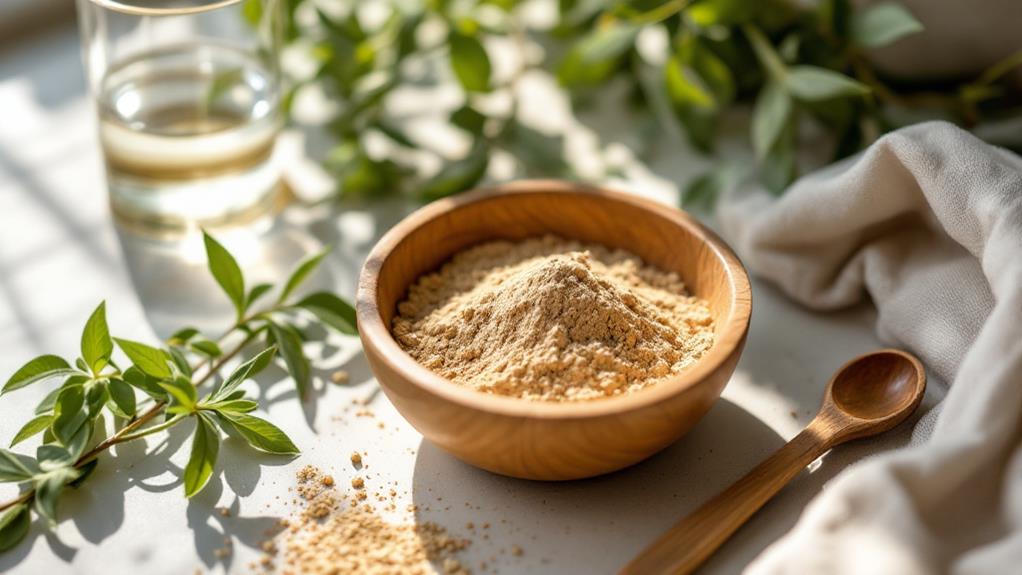Can Maca Help With Menopause Symptoms? A Natural Approach

You'll find that maca root, a plant from the Peruvian Andes, may naturally ease menopause symptoms like hot flashes and sleep disturbances. As an adaptogen, maca doesn't contain hormones but might influence your hormone levels through the hypothalamic-pituitary-ovarian axis. Many women report feeling less discomfort and enjoying better sleep and mood balance with maca. It also offers benefits beyond menopause, potentially enhancing energy and reducing anxiety. Typical doses range from 1.5 to 3.5 grams daily, though starting lower is wise. Ready to investigate this natural therapy's potential further?
Understanding Menopause Symptoms
Menopause marks a notable change in a woman's life, characterized by the end of menstruation and a drop in estrogen and progesterone levels, which leads to hormonal imbalances. These changes can be challenging, especially as you might experience hot flashes, night sweats, mood swings, and sleep disturbances. Up to 80% of women face these symptoms, which can start during the perimenopausal phase, several years before menopause officially begins.
Understanding these symptoms is vital for effective management. The decline in estrogen and progesterone causes your body to increase production of GnRH, LH, and FSH, contributing to these hormonal imbalances. This alteration not only affects your daily comfort and mental well-being but also poses long-term health risks. You may face increased chances of developing osteoporosis and cardiovascular issues, which can greatly impact your quality of life.
Symptom management becomes fundamental. Addressing these symptoms can help maintain your comprehensive health and well-being during this shifting phase. By managing hot flashes and other menopausal symptoms effectively, you can improve your quality of life and reduce the risks associated with osteoporosis and cardiovascular issues. Understanding menopause and its effects allows you to take proactive steps in this significant stage of life.
Maca Root Overview
For centuries, people have turned to maca root, a cruciferous vegetable native to the Peruvian Andes, to improve fertility and address diverse health conditions. Known scientifically as Lepidium meyenii, maca is celebrated for its rich nutritional profile that includes crucial amino acids, vitamins, minerals, and bioactive compounds. These components contribute to its reputation as a natural supplement for achieving hormonal balance.
Maca acts as an adaptogen, meaning it helps your body manage stress by modulating the HPA axis response. This adaptogenic quality can be particularly beneficial for managing menopause symptoms like hot flashes and mood swings. Unlike some treatments, maca doesn't contain hormones itself. Instead, it potentially influences hormone levels by promoting the best functioning of the HPO axis, possibly alleviating menopause-related symptoms.
Clinical trials have shown promising results with maca supplementation. Women experiencing menopause have reported significant improvements in their quality of life, finding relief from symptoms such as hot flashes and sexual dysfunction. Regardless of being taken as maca root powder or in supplement form, this natural approach from the Peruvian Andes offers a potential avenue for those seeking to manage menopause symptoms naturally and effectively.
Historical Uses of Maca

Maca's rich history in the Peruvian Andes dates back over 2,000 years, where indigenous cultures cultivated it not just for sustenance but for its remarkable adaptogenic properties. These ancient communities recognized maca's ability to help the body adapt to stress and maintain hormonal balance, making it a valuable tool in their daily lives. They didn't just see it as a food source; they revered it for its medicinal benefits, using it to address respiratory conditions and rheumatic diseases.
In historical use, maca was primarily celebrated for enhancing fertility and energy levels. Its reputation as a fertility enhancer made it a crucial part of traditional practices aimed at improving reproductive health. Furthermore, it was considered a natural remedy for sexual dysfunction and menstrual irregularities, particularly among women. This emphasis on hormonal balance is why maca has maintained its relevance in contemporary herbal medicine.
Today, the legacy of maca's historical use continues as it is recognized for its potential to alleviate menopausal symptoms. The same adaptogenic properties that ancient Peruvians valued are now being examined for their benefits in managing the complex hormonal changes associated with menopause, offering a natural approach to modern health challenges.
Hormonal Balance With Maca
Building on maca's rich history, its role in supporting hormonal balance has gained significant attention in managing menopause symptoms. Maca root is believed to influence the endocrine system, potentially stabilizing hormone levels, including estrogen and progesterone. This can be essential for alleviating menopausal symptoms, which often arise from hormonal imbalances. For postmenopausal women, maca's ability to manage estrogen levels may be particularly beneficial. A study showed that early postmenopausal women experienced a drop in follicle-stimulating hormone (FSH) levels and an increase in luteinizing hormone (LH) levels after two months of maca use.
Clinical trials suggest that maca can improve the quality of life for those experiencing menopause by reducing symptoms like hot flashes and sleep disturbances. Remarkably, there's a reported 59% reduction in the severity of menopausal discomfort among users. As an adaptogen, maca helps your body adapt to stressors, potentially modulating the cortisol response and reducing symptom severity. This adaptogenic property positions maca as a promising natural alternative to hormone replacement therapy (HRT), offering a non-hormonal method to manage hormonal fluctuations. Through this natural approach, maca provides a viable option for addressing the challenges of menopause.
Menopausal Symptom Relief

Maca offers promising relief for menopausal symptoms, making it a notable natural option for many women. If you're steering through the challenges of menopause, maca root could be a game-changer. Clinical trials indicate that maca can considerably reduce symptoms like hot flashes and sexual dysfunction. For women experiencing these issues, particularly those on SSRIs, maca provides a natural alternative to hormone replacement therapy.
A 2016 study showed a 59% reduction in symptom severity among participants after just two months of maca supplementation. This suggests that maca's adaptogenic properties might help modulate hormonal fluctuations, leading to improved mood and reduced anxiety. Additionally, a 2006 study found that postmenopausal women had increased estradiol levels and reduced FSH levels after taking maca, highlighting its hormonal balancing effects.
For those struggling with sleep and general wellbeing, maca might offer relief. In a trial with early postmenopausal women, 42% reported reduced discomfort after one month of treatment, with notable improvements in sleep by the end. If you're seeking a natural approach to managing menopausal symptoms, maca root might just be the solution, enhancing both your comfort and wellbeing.
Benefits Beyond Menopause
Release a world of benefits with maca that extend beyond menopause. While it's renowned for easing menopause symptoms, maca root also offers a host of advantages for postmenopausal women and others. Its adaptogenic properties are particularly remarkable, helping your body manage stress more effectively. By reducing fatigue and improving physical performance, maca can elevate your energy levels, enabling you to tackle daily challenges with renewed vigor.
Maca root is packed with flavonoids, which contribute greatly to mood improvement. Research highlights its potential to alleviate anxiety and depression, especially in postmenopausal women. These mood-enhancing properties can make a real difference in your emotional well-being. Furthermore, maca is rich in antioxidants, which combat oxidative stress, safeguarding your cells from damage and promoting general health.
Beyond mood and energy, maca root might improve sexual health. Although studies mainly focus on male fertility, the general improvement in energy and mood can have positive effects on sexual well-being for everyone. Maca's nutritional profile, brimming with vital amino acids, vitamins, and minerals, supports muscle growth and repair, making it a valuable ally in maintaining a healthy lifestyle. Accept maca's multifaceted benefits and thrive beyond menopause.
Maca Dosage Guidelines

When considering maca root supplementation, understanding proper dosage is vital for maximizing its benefits. The typical dosage in studies ranges from 1.5 to 3.5 grams daily, lasting up to 16 weeks. A clinical trial focusing on menopausal symptoms administered 2000 mg of maca daily, which equals four custom-made capsules. Starting with a lower dosage and gradually increasing it allows you to assess your individual tolerance and effectiveness. This gradual approach helps you experience the potential health benefits while minimizing any unwanted side effects.
Before beginning any maca supplementation, a consultation with healthcare professionals is significant. They can offer personalized maca dosage guidelines, particularly if you have existing health conditions or are on medication. It's essential to recognize that high doses might lead to side effects such as digestive issues, altered menstrual cycles, and mood changes. Hence, moderation is key to safely enjoying maca's benefits.
Safety and Side Effects
As you consider adding maca root to your regimen, it's vital to be aware of its safety profile and possible side effects. While maca is generally recognized as safe for most users, potential side effects can occur. Some individuals experience digestive issues like bloating or gas. These symptoms might be mild, but they're worth monitoring as you begin supplementation.
If you have hormone-sensitive conditions, exercise caution since maca can influence hormone levels. This could pose risks, making it important to approach maca supplementation with care. Common side effects include altered menstrual cycles, moodiness, abdominal cramps, and insomnia. Be vigilant for any adverse effects and adjust your intake accordingly.
Consultation with a healthcare professional is strongly recommended before starting maca supplementation, especially if you're on medications that might interact with its compounds. A professional can help guarantee your safety and guide you on the best course of action based on your unique health circumstances.




